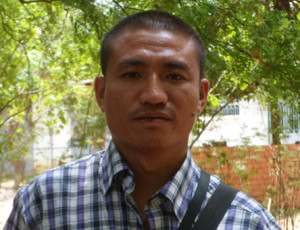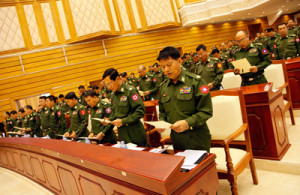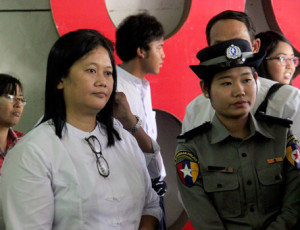Free U Gambira
U Gambira was a leader of the 2007 Saffron Revolution and a former political prisoner. He was arrested in 2007 and sentenced to 68 years in prison. He was brutally tortured and mistreated in prison, and has permanent health problems as a result. He was released in 2012.
On 19th January 2016, he was arrested by around 20 police officers at his hotel room in Mandalay. He was charged under the Burma 1947 Immigration Act for illegally crossing the border and entering the country. U Gambira, who now lives in Thailand, travelled to Burma to obtain a new passport, and he was able to cross the Thailand-Burma at an official crossing point without facing any problems.
He is currently being detained in Obo prison while his trial continues. He was refused bail despite the fact that he is suffering from physical and mental illness, which requires him to take regular medication.
Please take action to free U Gambira and all remaining political prisoners in Burma.
Fantastic news from Burma
Around 180 political prisoners in Burma have been released in the last two weeks.
Burma Campaign UK was established after the military regime refused to accept the election result in 1990. Now at last, after years of campaigning in Burma and internationally, there is an NLD-led government that the people of Burma have voted for. And already we are seeing positive changes, with political prisoners starting to be released.
These releases show that campaigning does work. However, there are many political prisoners remaining in jail. For example, Kachin farmer Lahpai Gam, who was sentenced to 20 years in jail under false accusations, is still in jail. It is very important that people like Lahpai Gam are not forgotten.
If we draw the attention of the NLD-led government to the remaining political prisoners, hopefully they will also be released. So we are going to continue our campaigns for the release of all remaining political prisoners in Burma so they can also go home and be with their families. We still need your help to make that happen.
Released political prisoners who we campaigned for include:
Naw Ohn Hla Released!
A prominent woman activist, Naw Ohn Hla, was arrested for protesting outside the Chinese Embassy in Rangoon. She was sentenced to 6 years and 2 months with hard labour in Insein Prison in Rangoon.
Htin Lin Oo Released!
Htin Lin Oo is a writer and a former Information Officer from the National League for Democracy (NLD). On 23rd October 2014, he gave a speech at a literary event in Chaung-U Township in Northern Burma. During his speech he criticised the use of Buddhism to promote discrimination and prejudice in the country. He was sentenced to 2 years in prison.
Union leaders Released!
Naing Htay Lwin and Myo Min Min are two union leaders who were arrested for organising protests calling for a pay rise of $1 a day. They were arrested for protesting without permission, and they were also falsely accused of advocating violence during protests. They were sentenced to 2 years and 6 months in prison.
Aung Soe Released!
Aung Soe is a member of Yangon People’s Support Network and a former political prisoner. He has been arrested numerous times for his peaceful activities. In 2013, he was arrested and sentenced to eleven and a half years in prison for his part organising protests with farmers to plough land which had been confiscated by the Burmese government.
Htin Kyaw Released!
Htin Kyaw, a human rights activist, has been repeatedly arrested and jailed for his peaceful political activities. He was arrested on 5th May 2014, and charged under two different counts including under Article 18 of the Peaceful Assembly Law. He was sentenced to 13 years and 6 months in Insein prison.
Nilar Thein Released!
Nilar Thein was arrested by police for allegedly supporting student protests against the controversial Education Bill last year. Nilar Thein was charged under Article 18 of the Peaceful Procession Law. She was on trial while being remained in detention.
Where Has Burma’s Peace Money Gone?
Article in the Irrawaddy today quoting Burma Campaign UK director Mark Farmaner:
Under former President Thein Sein’s government, over US$100 million poured into Burma’s peace programs by foreign governments and institutions.
As the military-backed administration has given way to a National League for Democracy (NLD)-led government, questions linger about the transparency and influence of international funds on the peace process—critics argue that this aid has thus provided war-affected ethnic communities with little to no benefit. …
Burma Campaign UK’s Farmaner said that a lack of transparency surrounding aid to the peace process indicates that it is time for international donors to rethink their approach, and strive for more inclusivity. “By backing the MPC with millions of euros, [the EU] was seen by many ethnic people to have taken the government side,” said Farmaner.
This was echoed by Audun Aagre, director of the NGO Norwegian Burma Committee, who told The Irrawaddy that unbalanced support by international donors is the most pressing issue regarding current peace funding. “Instead of strengthening these systems, with a long term goal of merging the different structures into a federal union, the international community cut support, and channeled these funds through Naypyidaw with MPC as a gatekeeper,” he said.
At the NASUWT conference in Birmingham
We are at the NASUWT’s conference in Birmingham to ask delegates and supporters to stand with the women of Burma to end rape and sexual violence.
NASUWT is one of the biggest teachers unions in the UK and a great supporter of freedom and democracy in Burma.
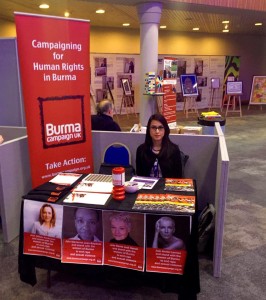
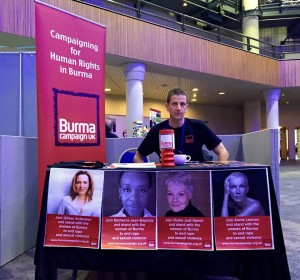
The clever and contrary Burmese military
Opinion piece in Democratic Voice of Burma by Mark Farmaner, Director of Burma Campaign UK
Love them or hate them, you have to hand it to Burma’s military, they are very smart. Characterisations of them being crazy and superstitious are simply wrong. In various forms, the military has run Burma for more than 50 years, far longer than most regimes last. There have been some bumpy transitions of leadership during this time, and the odd purge, but overall, despite personal rivalries, they have stayed disciplined and united. Hopes and predictions of splits and collapse were proved wrong. Their effectiveness and ruthlessness in dealing with opponents in Burma as well as within their own ranks helped ensure their longevity in power.
On the international stage, the Generals ran rings around the United Nations and governments, avoiding the imposition of the strongest sanctions called for by democracy and human rights activists. UN envoy after UN envoy were duped by the tactic of promises of future reform and manufactured soft-liner hard-liner divisions within the regime. Reclusiveness and games played with the granting of visas helped mute criticism, and the bar on improvements set so low that just getting into the country was considered a diplomatic success.
A skillful game of divide and rule was played with powerful neighbours India and China. Cheap deals over natural resources were used to buy political protection from neighbours on the international stage. Restrictions on access for international humanitarian agencies left them so fearful that almost uniquely around the world, they stayed almost completely silent on human rights violations and the root causes of poverty in the country.
Then, when a combination of domestic and international pressure finally did force the military to accept reforms would need to happen, they did so slowly, at their own pace, and on their own terms. They brought in a new constitution which would guarantee that they still controlled the key levers of power in the country, would have the legal power to retake control, and could veto any attempts at further reform which might threaten their power and interests.
It isn’t full democracy, but it looks a lot like it, and they calculated correctly that western countries, which would reject any such system in their own countries, would agree that it was good enough for Burma. They also persuaded their main opponents in the country to agree to work within their constitution.
And their plan has worked, almost all sanctions have been lifted, there has been a massive increase in aid and trade, they have been embraced diplomatically, and praised for their reforms. Military to military contacts have been established by the USA and others, and the British government even provides them with free training.
They get first claim on the government budget, they have billions of dollars-worth of military owned companies, and have sold off companies, natural resources and government contracts worth billions more to themselves, their relatives, friends and cronies.
The November 2015 election was the culmination of their careful transition plan to a new political system in Burma, which they see as essential to their survival. The constitution was designed knowing an NLD election landslide was likely. Hence the guaranteed seats in parliament, the high bar for changing the 2008 Constitution, and military appointed ministers. They needed the election to go smoothly, and they need a smooth handover of power. They have been applauded domestically and internationally for following their own plan.
They have power and money, and have gone from pariah to praise. So with everything going so well for them, having been so smart in developing and implementing this transition plan, why are they going after people like U Gambira, recently arrested on ridiculous immigration charges? Why are they throwing people like Patrick Kum Jaa Lee and Chaw Sandi Htun in jail for a Facebook post? Why are the students who protested last year facing such serious charges?
There has never been any justification for how the military arrested and jailed thousands of its critics over the past 50 years, but you could at least see how, from the military point of view, it was afraid that even the smallest criticism could grow to become an uprising that could threaten its rule. The same cannot be said now.
When soldiers join the military, they know that they might have to take a bullet, but at the moment, they are shooting themselves in the foot. With all their power and success, does a Facebook post really threaten them? Does U Gambira, who has not even been politically active recently, pose a threat to their power and wealth?
Uprisings took place roughly every ten years in the past, but an uprising is inconceivable now. One of the biggest threats the military face now is themselves. Whether it’s old habits dying hard, revenge, or Senior-General Min Aung Hlaing being a sensitive soul with a thin skin, arresting old critics, students, and people who might have said something on Facebook, is just plain dumb. It isn’t in the interests of the military.
They designed a constitution with a democratic face, where their power lies largely behind the scenes. The more they step into the forefront, arresting and jailing critics, the more they remind people of how they still control key levers of power, and the more people will demand the removal of their power.
Myanmar military “doesn’t need tricks” – it holds all the cards
Southeast Asia Globe interview with Mark Farmaner, director at Burma Campaign UK:
Myanmar’s majority National League for Democracy (NLD) party, led by the celebrated Aung Sang Suu Kyi, has put forward two preferred candidates for the presidential position: Henry Van Thio, an ethnic Chin, and Htin Kyaw, a 70-year-old NLD stalwart and trusted aide to Suu Kyi, It seems likely the latter will be the next person to lead Myanmar, at least in designation.
What’s your reaction to the NLD’s announcement?
There’s no surprise here that Aung San Suu Kyi has chosen someone who has been loyal and close to her for many years. And we were also expecting that she would select one candidate from one of the ethnic minority groups, because she said she wanted to be more inclusive.
What’s your opinion of Htin Kyaw?
He’s a good choice. People are already calling him a puppet, but he’s very smart – an educated man. He has a lot of experience running different organisations, so he is someone who comes with some experience. Obviously, at the end of the day, Suu Kyi will still be making all the key decisions in the government.
Do you think the military will have any tricks up its sleeve?
The military doesn’t need to have any tricks up its sleeve. It has had this transition plan where it knew an NLD election victory was inevitable and it has designed a constitution to ensure that it still controls key ministries. They will still have power and influence over government, regardless of the NLD victory. There’s no reason for them to make a fuss because, with the implementation of the plan, they need everything to go smoothly.
For the military, it was always unacceptable for Suu Kyi to become president. That’s a red line for them and that’s why they put the clause in the constitution to prevent her from becoming president. It will be an NLD-led government power sharing with the military. The key cabinet positions will be controlled by the military, the military get to choose the budget before the rest of the government and the most powerful institution is not the parliament, it’s the National Defence and Security Council, which has 11 members, six of which are from the military. So for the military, their interests are protected and as long as it’s not Suu Kyi, I don’t think they care who the president will be.
International Women’s Day: 110 Renowned Women call on Burma’s Government to end rape and sexual violence
Our campaign is reported in Karen News today:
High profile women, including actress Dame Judi Dench and actress Gillian Anderson, have put their names to a document calling on action to stop the sexual assault and rape of women in Burma.
Zoya Phan, a campaigner for human rights in Burma, said rape was being used as a weapon of war: “The continuing use of rape and sexual violence by the Burmese Army is a crime, and the lack of action to stop it is a scandal.”
High profile women sign pledge to end impunity for rape and sexual violence in Myanmar
Mizzima cover our campaign, supported by over 100 high-profile women, to end rape and sexual violence in Burma:
On International Women’s Day, 110 high profile women, including Dame Judi Dench, Annie Lennox, Jo Brand, Gillian Anderson, Imelda Staunton, Julie Walters and Zoë Wanamaker, are standing with the women of Myanmar to end rape and sexual violence according to a statement from the Burma Campaign UK.
According to the statement, “The Burma army has used rape and sexual violence against women for decades as part of their warfare against ethnic minority groups in the country. This has been done with impunity and denial. Cases of women and girls being raped by soldiers from the government’s forces include the rape of a 12 year old girl in front of her mother, and of a disabled woman. Many of the victims were gang-raped, and many killed afterwards. This is in breach of international law, and constitutes a war crime. Reports of rape have increased in recent years. UN reports have described rape and sexual violence as ‘widespread and systematic.’”
UK campaign group urges Minister of Home Affairs to release Nilar Thein
Our campaign to free activist Nilar Thein is reported in Mizzima today:
Burma Campaign UK has urged the Minister of Home Affairs, Lt Gen Ko Ko, to immediately release Nilar Thein and to reform the Prisoners of Conscience Affairs Committee the group said in a statement on 25 February 2015.
On 24th February 2016, Nilar Thein was arrested by police from Bayinnaung Police Station in Yangon for allegedly supporting student protests against the controversial Education Bill last year. The Education Bill limits academic freedoms and prohibits the formation of student unions.
Nilar Thein is one of the prominent leaders of the 88 Generation Peace and Open Society Group and a former political prisoner. She was previously arrested in 2008 and sentenced to 65 years in prison. She was released in 2012, and has continued her political activities, the statement said.
“Nilar Thein’s case shows how activists are continuing to get arrested under the repressive laws in Burma” said Wai Hnin, a Campaigns Officer at the group. “It is absurd that a prominent leader like Nilar Thein has been arrested for her political activities from last year. The arrest of Nilar Thein is unlawful and she should be released immediately.”
Nilar Thein was charged under Article 18 of the Peaceful Procession Law. She is currently being detained in Insein Prison while her trial continues.
Human rights groups push for extension to rapporteur role
Myanmar Times:
The special rapporteur’s post will come up for review at the end of the month when the UN Human Rights Council convenes on February 29. Special rapporteurs are independent experts appointed by the council to investigate, monitor and report back on human rights problems.
“A lot of governments, and obviously the Burmese military, favour removing or changing the mandate of the special rapporteur,” said Mark Farmaner of Burma Campaign UK. “She [Ms Lee] has consistently highlighted very serious ongoing human rights violations, in stark contrast to the more rosy picture that the United Kingdom, European Union and United States have often tried to present in order to justify dropping human rights as their priority in Burma.”

